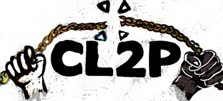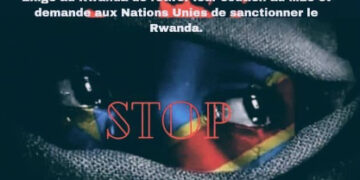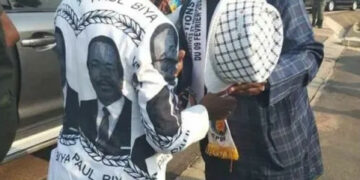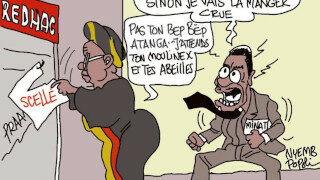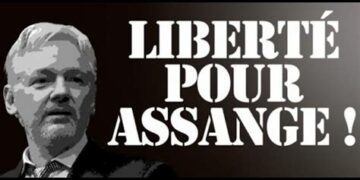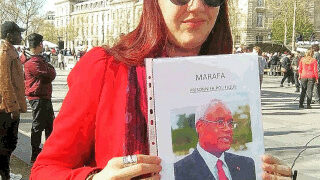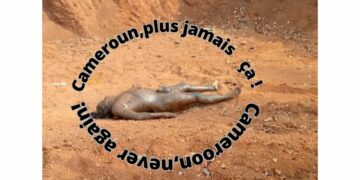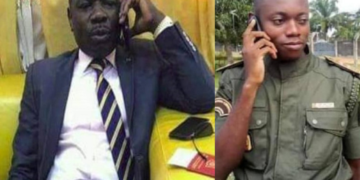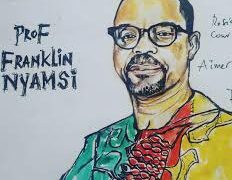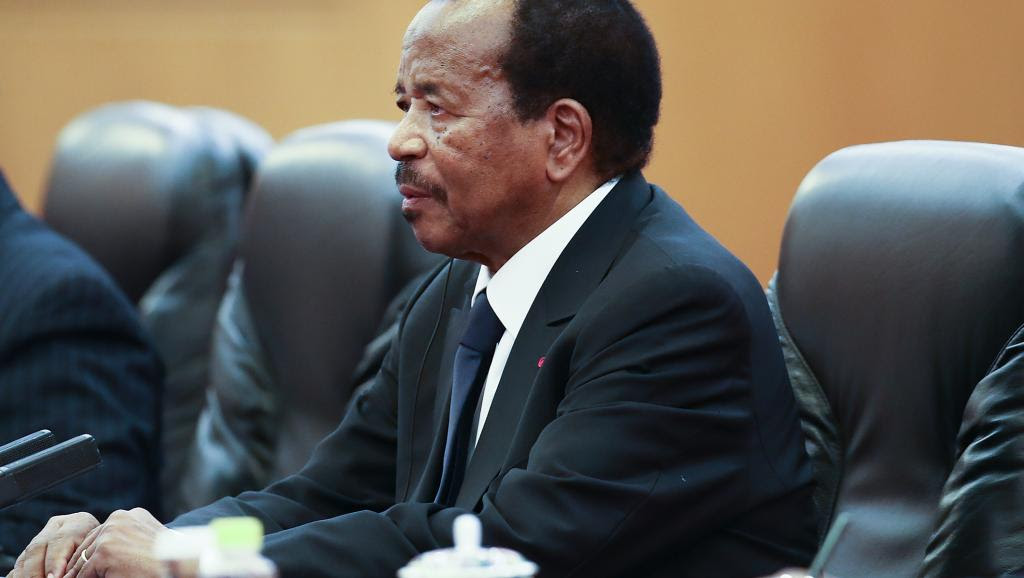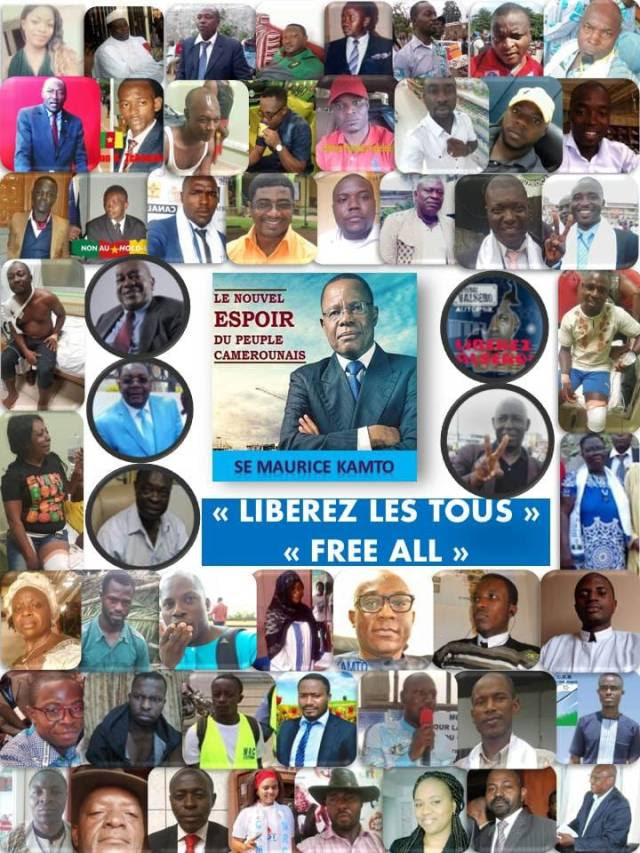A group of worried Israelis are calling for immediate measures to ban the sale of arms to Cameroon after photos of weapons used by Israel as part of the government’s brutal war against the population of southern English-speaking Cameroon. The 85-year-old Cameroonian dictator Paul Biya is the longest serving despot in the world. He has led the country with an iron fist since 1982.
This is the letter yesterday sent by Israeli lawyer Eitay Mack to Racheli Chen, head of the Israel Defense Export Control Agency at the Israeli Ministry of Defense, entitled “Subject: Urgent Application for Article 9 of the Defense Export Control Act in the case of the Bir unit (Bridade d’intervention rapide, editor’s note) in Cameroon “. It is a precise summary, although revolting, of the horrible conduct of the Cameroonian army:
1. This letter is sent on behalf of human rights defenders Aya Gavriel, Yael Frenkel, Sahar Vardi, Vered Keisar, Shai Eistein, Guy Butavia, Ofer Neiman, Niv Hachlili, Guy Yadin-Evron, Noam Yadin, Elisheva Kravtzov and Uri Agnon, Gal Alfasi, Vered Bitan, Amir Bitan and Yaniv Yurkevich and in my name.
2. Since October 2016, a serious political crisis is raging in the English-speaking provinces of Cameroon, located in the south-west and north-west of the country, near the border with Nigeria.
3. These regions cover an area of 16,364 km 2 out of a total of 475,442 in Cameroon, and 5 of the 24 million Cameroonian citizens reside there. These areas contain the political base of the main opposition party – the Social Democratic Front (SDF) – and are very important economically, especially for the oil industry, which accounts for 10% of the country’s GDP.
4. The political crisis originated in the creation of Cameroon: between 1885 and 1915, the entire region of Cameroon was a German colony. After the First World War, the League of Nations divided the mandate between France and Great Britain. French Cameroon gained independence from France on 1.1.1960, while British Cameroon gained independence from Great Britain and decided to join the former French Cameroon on 1.10.1961.
5. During the French and British Mandate in Cameroon, both administered the area under their control differently. In the British Mandated Provinces, the official language was English, the legal system was that of the common law, and society, money, and education systems were based on the British model. In addition, Great Britain allowed a relative freedom of expression and of press, as well as autonomous local institutions. On the other hand, the French mandate was very centralized, the legal system was continental and the official language was French. The less democratic character of the French mandate reflected the centralized development of state institutions in Cameroon after the unification of the French and British parties. Thus, the massive political arrests of dissidents and regime critics began in 1962.
6. The consent to unification given by the residents of the British Mandated Territory consisted in making Cameroon a federation, including the recognition of the English as an official language with French, and to stipulate that the president and his deputy, at all times, represent both states. Despite this, between 1961 and 1972, the autonomy of the English-speaking provinces was refused by a creeping process and the system became centralized with the French-speaking majority.
For example, in 1966, Cameroon became a one-party State – “Cameroonian National Union”; in May 1972, the Federation is effectively canceled and the United Republic of Cameroon is founded; it was not until 1990 that Cameroon became a multi-party state and the aforementioned Sdf party was founded. Starting in 2017, the overwhelming majority of senior positions in the executive, judicial and legislative branches are occupied by representatives of the French-speaking provinces.
7. While some leaders of the English-speaking provinces acted in international forums to promote their independence, separatist groups calling for a violent struggle were established, and Cameroonians from these immigrant provinces in other countries supported politically and economically their loved ones who remained on square. . But it was not until 2016 that the situation became volatile, so as to jeopardize the stability of the entire country.
8. The crisis started on 11.10.2016 when the lawyers went on strike. They demanded that state laws be translated into English, criticized the takeover of the continental legal system and the appointment of French-speaking judges to the courts of the English-speaking provinces. Their strike and demonstrations garnered widespread support and public interest in the ongoing discrimination and marginalization in Cameroon against the English-speaking provinces. In addition, calls for the return to a federation or total independence have multiplied.
9. On 21 November 2016, teachers also went on strike and started protesting, due to the appointment of non-English speaking teachers and the attempt to marginalize the British educational model in schools and colleges. these provinces.
10. Strikes and demonstrations by teachers and lawyers have triggered a “snowball” in the English-speaking regions, which are heavily oppressed. Cameroon security forces, including the BIR group, used live ammunition against protesters, attacked universities, businesses and residential buildings, beat civilians, raped students and arrested political leaders in those areas, who became de facto military zones.
One of the detainees is a judge of the Supreme Court of Cameroon. The school system was closed for one year and in January 2017, the state blocked Internet access in the region for several months, which affected many companies. Some of those arrested have been tried by military courts on the basis of draconian anti-terror laws. Tens of thousands of people have fled to refugee camps in Nigeria2 and many have left their villages hiding in the forest.
11. On 15.12.20163, the African Commission on Human and Peoples’ Rights issued a condemnation of the violence perpetrated by the security forces in the English-speaking provinces:
The Rapporteur of the Commission for Cameroon and the Special Rapporteur on human rights defenders in Africa, the Hon.Commissioner Reine Alapini-Gansou is deeply concerned about the deterioration of the human rights situation in Cameroon, including the killing of civilians; the deployment of armed military personnel, special security forces (Bir) and war machines in these two regions; the disproportionate and lethal use of force and violence to deter peaceful, unarmed lawyers, teachers, students, civilians and demonstrators in Bamenda, Buea and Kumba; rape of students in Buea; arbitrary arrests, detentions and ruthless beatings orchestrated by the police, the gendarmerie, the army and the BIR following strikes and demonstrations that have been taking place since October 2016.
The Special Rapporteur has received reports that strikes and demonstrations allegedly provoked by the so-called “anglophone problem”, due to the dissatisfaction of anglophone lawyers, teachers and civil society in English-speaking Cameroon speaking of Cameroon legitimately and peacefully, seeking to term to; but systematic destruction and erasure of the legal system of the common law and the Anglo-Saxon educational system; the marginalization and neglect by the Cameroonian administration of the two English-speaking regions of Cameroon;and the return to the federal system of governance.
The Special Rapporteur is particularly concerned at the allegations of the deaths of more than nine Cameroonians during the Bamenda, Buea and Kumba protests, as well as allegations that the government is planning mass arrests, kidnappings, and assassinations of government officials. associations of lawyers. trade unions, civil society and human rights defenders as a means to thwart the Anglophone cause.
12. In October 2017, following the intensification of demonstrations in the English-speaking provinces marking the day of Britain’s independence, violent repression by the security forces, including the Bir is intensified. Any assembly of more than four people was forbidden. Bus stations, restaurants and shops have been closed.
Security forces set up checkpoints restricting the freedom of movement between different parts of the English-speaking provinces, watch posts were installed on the roofs of buildings and the Minister of Communication announced that he would close any media who would support those who demanded independence.
13. On 29.1.2018, the African Commission on Human and Peoples’ Rights issued another statement condemning the violence committed by security forces in the English-speaking provinces:
Since October 2016, the human rights situation in the Republic of Cameroon has continued to worsen as a result of the brutal repression of legitimate and peaceful demonstrations by lawyers, teachers and members of civil society in the English-speaking North West Southwest, who called for the preservation of English-speaking legal and educational systems in their regions, the end of marginalization and better management of regions by the state in terms of development and infrastructure.
The Commission is particularly concerned about the deployment of soldiers in these areas, the disproportionate use of force against unarmed civilians and the intermittent closure of communications such as the Internet.
The Commission is deeply concerned by reports of cases of enforced disappearance, arbitrary detention in deplorable conditions, the prohibition of peaceful demonstrations and constant insecurity that has resulted in the displacement of more than 5,000 English-speaking Cameroonians to Nigeria from the beginning of the crisis, without means of subsistence or access to basic necessities.
The Commission strongly condemns the ongoing violence and human rights violations in Cameroon, in particular the militarization of the English-speaking regions and the disproportionate use of force against the population.
Therefore, in parallel with the condemnation of violence by Cameroonian security forces, the Commission called for:
1. the Commission calls on the Government of the Republic of Cameroon to fulfill its obligation to protect and:
2 to immediately stop the use of force against unarmed civilians;
3. Ensure respect for the right to freedom of expression and information, freedom of association and assembly, and the right to liberty and security of the person enshrined in the Charter;
4. Ensure the immediate release of all persons arbitrarily detained since October 2016 following the demonstrations;
5. Conduct impartial and independent investigations into allegations of extrajudicial killings, enforced disappearances, inhuman and degrading treatment and human rights violations allegedly committed by police, gendarmes and military personnel;
6. to engage without delay in constructive dialogue with a view to putting an end to the suffering of the population.
14. Human rights groups and Cameroonian activists report that the unit that most terrorizes the population of the English-speaking provinces is the Bir unit, also known as “Israeli unity”. According to reports, soldiers from this unit attack villages, organize military processions in residential neighborhoods, are involved in looting, torture, abuse of men, women and children, as well as live ammunition on protesters and civilians. Like the demolition of commercial and residential buildings.
15. The unit was created in 2001 for the official purpose of combating criminal organizations. In fact, this unit, along with the Cameroonian Presidential Guard, is intended to secure the dictatorial regime of Paul Biya, who has been in charge of the country since 1982. Biya created these units because of his mistrust of the army and his army. his fear of a military coup.against him. The Bir unit is directly subordinate to the president and only reports to himself, which is exceptional.
16. Although the Bir unit also receives weapons and training from the United States, it is called “Israeli unity” because according to reports, this which is exceptional, besides the Israeli training and advisory services, a former Israeli officer commanded the unit – Lieutenant-Colonel (Reserve) Avi Sivan (former head of the Israeli unit Duvdevan during the first intifada), who was killed in a helicopter crash in Cameroon in 2010. Before providing security services to dictator Biya, as Israeli military attache in Cameroon.According to reports, after Sivan’s death, another former Israeli army officer replaced him.
17. Images of the Bir unit, published by the media and provided by human rights activists in Cameroon, indicate that his soldiers use Israeli weapons, including Galil, Ace Galil, Tavor rifles and Negev machine guns.
18. In early 2014, Bir became Cameroon’s special military unit to fight the deadly terrorist group Boko Haram. The latter has murdered thousands of civilians in northern Cameroon, abducted women and girls to use them as sex slaves, and made 200,000 refugees refugees.
19. Unfortunately, as in the case of Nigeria, the justifiable war against the Boko Haram terrorist group has become a war against civilians belonging to communities and ethnic groups from which fighters have been recruited into the terrorist group, by committing serious violations of human rights and human rights.
War crimes! Cameroonian security forces carried out acts of torture, disappearances, extrajudicial executions, rape and unlawful deprivation of liberty.
20. The Bir unit, which leads the fight against Boko Haram, is one of the main units accused of crimes. For example, Amnesty International’s 2017 report “The Secret Chambers of Torture in Cameroon” describes serious acts of torture committed against civilians – both men and women – as well as children and persons with disabilities in detention centers. unofficial detention, in bases serving the Bir operation unit, and even in its headquarters in the north of the country.
Torture includes: beatings (with electric cables, wooden or metal sticks, chains, machetes, etc.), repeated beating of the feet to prevent the prisoner from walking, tying his arms and legs behind his back (called “the goat”). “), Tying the detainee’s arms and legs together behind his back and suspending them in the air (called” The Swing “), suffocating by thrusting the inmate’s head into a water can, causing burns to the inmate’s body , tearing nails, electrocution and more. Inmates had to perform their bodily functions on themselves or in a bucket and they did not receive any medical treatment.
21. Although the Bir unit was not involved in crimes against civilians in Cameroon, as part of the war against Boko Haram and in general, a special anti-terrorist military unit whose task is counter-insurgency , is certainly inappropriate for legitimate treatment. The civil demonstrations of teachers, lawyers, students and others, and the decision to send him to the English-speaking provinces testify to the true intention of dictator Biya: elections will be held in Cameroon this year, and Biya, aged 85-year-old, fears that the event will materialize. Spread to other regions, where the political and economic conditions are no less gloomy.
22. In these circumstances, given the crimes to which the Bir unit is implicated throughout Cameroon, particularly last year in the English-speaking provinces, and fearing that the serious political crisis in Cameroon will degenerate in full control, civil war, I would ask you to freeze or cancel all secure export licenses to the Bir unit, until you can ensure that it is possible to verify that its soldiers do not are more involved in serious human rights violations, that committed crimes are being investigated and those responsible are brought to justice, and that the crisis in Cameroon is over.
23. This case does not concern Israeli “normal” security exports used for serious human rights violations, but rather a real intervention of the Israeli Ministry of Defense in the political life of another country, so neocolonial. The citizens of Israel, the State of Israel or the Knesset have never declared war on the inhabitants of the English-speaking regions of Cameroon and have never voted in favor of the eternal rule of an aging dictator.
24. Given the rapid escalation in Cameroon, I would appreciate your prompt response.
Source: agenceepressepanafricaine.com
